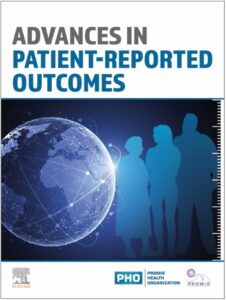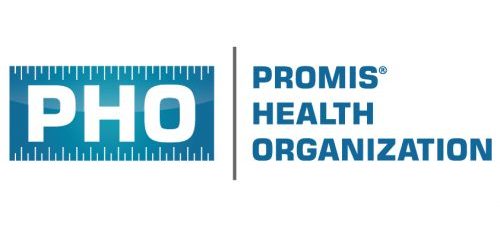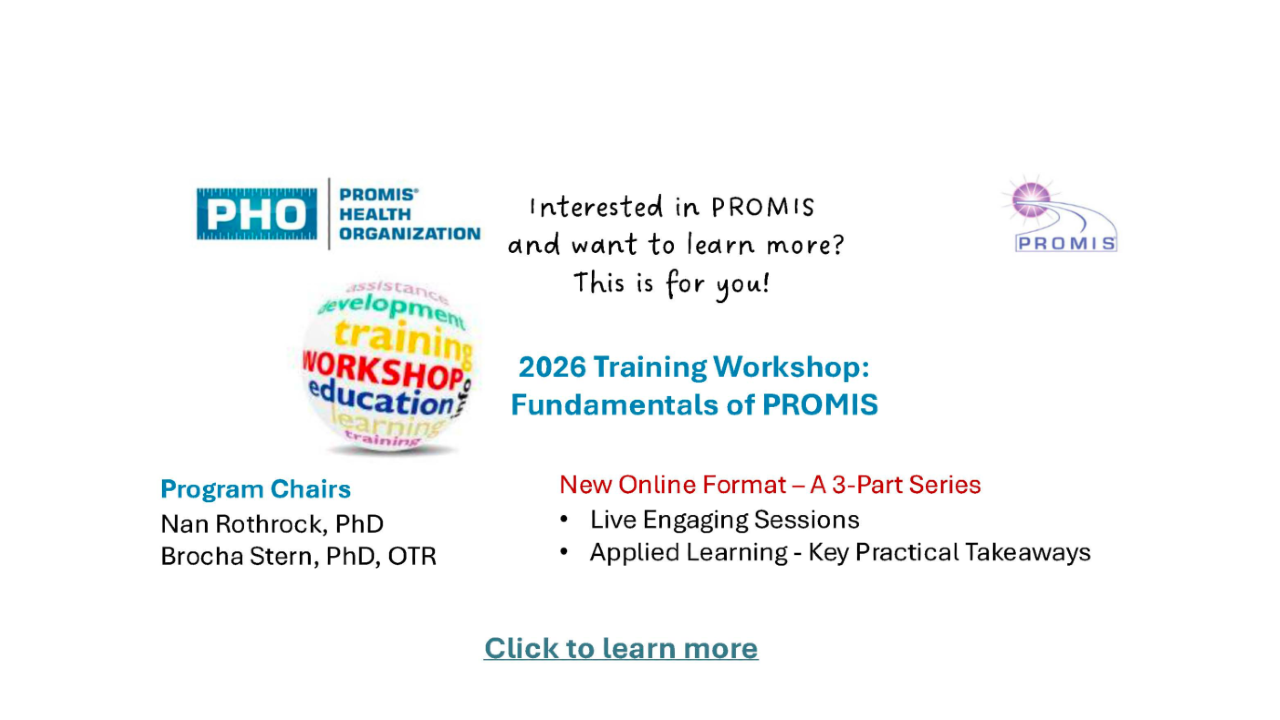Register Now!
The 2026 Training Workshop:
Fundamentals of PROMIS
New Online Format: A 3-Part Series
 The goal is to help you connect the dots – from fundamentals to putting PROMIS into practice.
The goal is to help you connect the dots – from fundamentals to putting PROMIS into practice.
Using a seminar model, this new online training workshop is designed for clinicians, researchers, health system leaders, and quality leads interested in getting started with PROMIS.
Program Chairs:
Nan Rothrock, PhD, Feinberg School of Medicine, Northwestern University, Chicago
Brocha Stern, PhD, OTR, Icahn School of Medicine at Mount Sinai, New York
Learn and Engage in Three Live Webinar Modules
1. Selecting the Right PROMIS Measure(s) for You
2. Optimizing Clinician and Patient Engagement in PROMIS Collection and Use
3. Making Sense of PROMIS Scores
Submit your research
to the official journal of the
PROMIS Health Organization
Author fees waived through 2026

Now pulished in APRO:
Abstracts from the 2025 PROMIS International Conference in Milwaukee
The journal considers original educational papers, current concepts, study protocols, research manuscripts, (systematic) reviews, commentaries on articles, and letters to the editor. The journal also publishes editorials, special issues, and conference abstracts.
Thanks for making
the 2025 Conference a Success!
The 11th Annual PROMIS International Conference
Leveraging the Patient Voice from Clinical
Decision-making to Policy: The Value of PROMIS
October 26-28, 2025 - Milwaukee
Congratulations
to the Trainee Best Poster Winners!
Best Clinical Poster
Electronic patient-reported outcome measures (ePROMs) for triaging and scheduling outpatient appointments: A systematic review
Chen He, MBBS, MRCP (UK)
National University Hospital, Singapore
Singapore
Best Psychometric Poster
The PROPr and QLU-C10D are more responsive to change than the EQ-5D-5L in cancer patients
Antje Förster, MD
Charité – University Medicine
Berlin, Germany
New Online IRT Course
This basic online course on IRT, presented in English by faculty at the Amsterdam UMC, focuses on the conceptual understanding of IRT. The course consists of 5 half days with an alternating series of lectures, R code practice, small working groups, and discussion.
Faculty are members of the Dutch-Flemish PROMIS National Center and include some examples from PROMIS item bank development.
For details, see https://www.epidm.nl/en/course/item-response-theory
Note: The PROMIS Health Organization is not a sponsor of this program and has not reviewed its content.
New Publications
James S, Lolacher L, Hodge K, Slavec J, Draper A, McPhate N, Houghton K, Guzman J, Tucker L. Mental health screening in pediatric rheumatology: a feasibility study. Pediatr Rheumatol Online J. 2025 Nov 19;23(1):117. doi: 10.1186/s12969-025-01166-4. PMID: 41258048; PMCID: PMC12628978.
The authors examined the feasibility of adding mental screening to routine care in a pediatric rheumatology clinic. Patients aged 8-17 electronically completed PROMIS Pediatric Anxiety v3.0 8a and Pediatric depression v3.0 8a, and both the child and their parent/guardian completed a brief acceptability survey. Patients were provided with resources based on their scores. Rheumatologists also completed a brief practicality questionnaire to assess their perspectives of feasibility. OUt of 44 patients, six had high anxiety scores, and two had high depression scores. Generally, responses were positive in terms of patient and parent/guardian acceptability, and most rheumatologists felt the mental health screening was worthwhile.
---------------
The authors aimed to define normative anxiety and depression using the Parent Proxy v3.0 Anxiety and Depression measures to further assist with score interpretation. The findings generally support the PROMIS v3.0 scoring with some decrease in score variability compared to what would be expected. The authors also provide information on score percentiles by gender and age group.
Zelicha H, Weitzner ZN, Park S, Babb TG, Bernhardt V, Ahmad FS, Cella D, Chen Y, Livingston EH. Improvement in breathlessness following bariatric surgery as measured by a new heart failure-specific health-related quality of life instrument: a prospective longitudinal study. Surg Obes Relat Dis. 2025 Oct 10:S1550-7289(25)00955-4. doi: 10.1016/j.soard.2025.09.014. Epub ahead of print. PMID: 41241567.The authors examined use of a 27-item PROMIS Profile developed for those with heart failure in a population with obesity undergoing primary bariatric surgery. Patients completed the measure before surgery and 1 year after surgery. The measured domains included dyspnea, fatigue, physical function, sleep disturbance, pain interference, depression, cognitive function, and ability to participate in social roles and activities. The profile measure was able to detect improvements in multiple domains after surgery. In particular, dyspnea affected most patients before surgery and was significantly improved after surgery.
PROMIS®, Patient-Reported Outcomes Measurement InformationSystem®, and PROMIS logo are registered trademarks of the U.S. Department of Health and Human Services (HHS).





